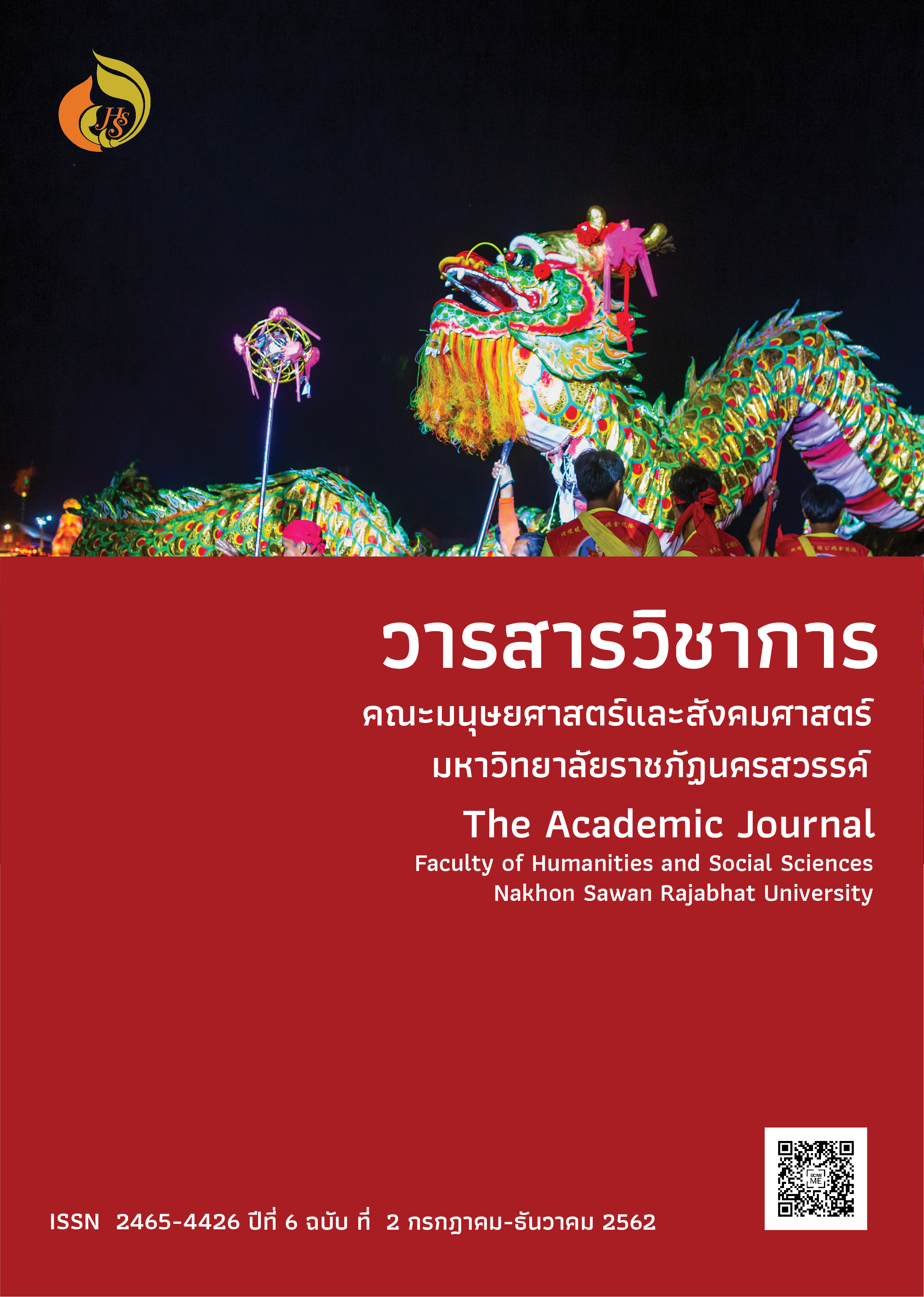The Guidelines for Promoting English in OTOP Tourism Community of Nong Nom Wua Sub-District, Lat Yao District, Nakhon Sawan Province
Main Article Content
Abstract
The purposes of this research were: 1) to study the guidelines for promoting English in OTOP Tourism Community of Nong Nom Wua Sub-District, Lat Yao District, Nakhon Sawan Province by participation of the community and 2)to develop language skills English for the community for use in communication within the community. Key Informants were executives, sub-district leaders, village headman, cultural council and people in OTOP Tourism Community of Nong Nom Wua Sub-District, Lat Yao District, Nakhon Sawan Province. In-depth interview, form Participatory observation, Group conversation, and workshop were used. The findings are as follows: Potential of cultural tourism management is ready for cultural tourism management. There is a source to learn history, Life style, Customs, traditions and local wisdom that indicate community identity. Tourism has developed the existing learning resources and developed new learning resources using English to promote tourism and use English to communicate in the community and realized the value create awareness of the management of capital and resources in the community. Heritage and traditions and local wisdom Training of knowledge in English for use in communication in the tourism community. Collaboration of all sectors Information system management, Organizing folk culture information systems, Guidelines for promoting English from interviews with people in the community are needed knowledge and skills in using English for communication. Therefore, there is a training to educate English communication skills to be used with tourism communities when foreign tourists come to visit the community in advance.
Article Details
References
5 มกราคม 2562, จาก http://plan.cdd.go.th..
การท่องเที่ยวแห่งประเทศไทย. (2556). รายงานการประชุมประจำปี 2556. กรุงเทพฯ: ประภาสการพิมพ์,
จิตพิสุทธ์ จันตะคุต. (2561). ความสำคัญของภาษาอังกฤษ. สืบค้น 8 มกราคม 2562, จาก
https://sites.google.com/site/krujitpisut/khwam-sakhay-khxng-phasa-xangkvs.
จุฑามาศ คงสวัสดิ์. (2550). การศึกษาแนวทางการส่งเสริมการท่องเที่ยวเชิงวัฒนธรรมจังหวัดนครปฐม.
นครปฐม: มหาวิทยาลัยศิลปากรม,
ชาชิวัฒน์ ศรีแก้ว. (2554). รัฐธรรมนูญแห่งราชอาณาจักรไทย พุทธศักราช 2540. กรุงเทพฯ:
สมานการพิมพ์,
บุญเลิศ จิตตั้งวัฒนา. (2542). การพัฒนาการท่องเที่ยวที่ยั่งยืน. เชียงใหม่: คณะมนุษยศาสตร์
มหาวิทยาลัยเชียงใหม่,
พจนา บุญคุ้ม. (2556). คู่มือการจัดการท่องเที่ยวโดยชุมชน. กรุงเทพฯ: โครงการท่องเที่ยวเพื่อชีวิต
และธรรมชาติ,
วันสาด ศรีสุวรรณ. (2553). รูปแบบการจัดการท่องเที่ยวเชิงวัฒนธรรมโดยการมีส่วนร่วมของชุมชนลุ่ม
น้ำตาปี (วิทยานิพนธ์ดุษฎีบัณฑิต). มหาสารคาม: มหาวิทยาลัยมหาสารคาม.
ศศิกานต์ เชิงหอม. (2552). การพัฒนาการท่องเที่ยวเชิงวัฒนธรรมบ้านพันนา ตำบลพันนา อำเภอสว่าง
แดนดิน จังหวัดสกลนคร (ปริญญาศิลปศาสตรมหาบัณฑิต). มหาสารคาม: มหาวิทยาลัย
ราชภัฏมหาสารคาม.
สินธุ์ สโรบล. (2546). แนวคิดการจัดการท่องเที่ยวโดยชุมชน. กรุงเทพฯ: สำนักงานกองทุนสนับสนุน
งานวิจัย.
สุรชัย ชนะบูรณ์. (2550). ศักยภาพและการจัดการท่องเที่ยวเชิงวัฒนธรรมบ้านเชียงเหียน ตำบลเขวา
อำเภอเมือง จังหวัดมหาสารคาม. มหาสารคาม: มหาวิทยาลัยมหาสารคาม.
องค์การบริหารส่วนตำบลหนองนมวัว. (ม.ป.ป.). ประวัติหมู่บ้านหนองนมวัว. สืบค้น 25 ธันวาคม 2561,
จาก https://www.nongnomwua.go.th/
Bailey, T. (1999). Foreign Language Anxiety and Learning Style. London: Longman.
Ellis, R. (2007). Task-based Language Learning and Teaching. Oxford: Oxford.
Richards, J. (2006). Curriculum Development in Language Teaching. Cambridge:
Cambridge University Press.
Sproule, K.W. (1999). The ecotourism equation: Measuring the impacts. Bulletin series
Yale School of Forestry and Environmental Studies. Newhaven: Yale University.
Willis, J. (1996). A Framework for Task-Based Learning. Essex: Longman.


